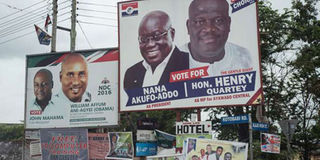A tale of two parties: Ghana campaigns heats up ahead of poll

Campaign billboards of Ghana's two main political parties running in this years national election in the streets of Accra in Ghana on October 8, 2016. At the moment, the race is extremely close. PHOTO | STEFAN HEUNIS | AFP
What you need to know:
- To date, the two parties have alternated power: the NDC candidate winning in 1992 and 1996; the NPP in 2000 and 2004; and the NDC in 2008 and 2012.
- This is then overshadowed by another question of how free and fair the elections will be, and whether the loser will accept the outcome.
Next Wednesday, Ghanaians will go to the polls to vote in the country’s sixth presidential and parliamentary elections since a return to multi-party politics in 1992.
As in previous elections, the race will ultimately be between the National Democratic Congress (NDC) candidate, President John Mahama, and the New Patriotic Party’s (NPP’s) Nana Akufo Addo.
To date, the two parties have alternated power: the NDC candidate winning in 1992 and 1996; the NPP in 2000 and 2004; and the NDC in 2008 and 2012.
The NDC casts itself as a mass party for the poor and uneducated, while the NPP has historically been associated with an educated elite and liberal values.
However, both campaigns focus less on ideology and more on the parties’ promises to build roads, schools, clinics and so forth; their capacity to provide jobs for an increasingly youthful population; and a commitment to tackle graft.
As the ruling party, the NDC’s request is for citizens to let them continue with their work in infrastructure development and job creation.
They insist that what they have been able to achieve since returning to power in 2008, far outweighs what the NPP achieved before it, and that many of the problems witnessed are the result of a global economic downturn beyond its control.
In contrast, the NPP dismisses the incumbent’s flagship projects as the work of any government, and claims that the NDC is wracked by corruption and has failed to provide jobs.
In turn, it promises to tackle graft and focus on job creation through, for example, it’s “one district, one factory” policy.
DIFFERENT APPROACH
Significantly, while the NDC and NPP both have regional strongholds – the NDC in the Volta region in the East, and the NPP in Ashanti in the centre – the campaigns have not been characterised by strong ethnic undertones.
Instead, both emphasise the need to build one Ghana, promote peace and avoid violence.
Both parties have also plastered the landscape with posters and billboards.
However, big rallies are relatively few and far between.
Instead, both parties have opted to focus more on door-to-door campaigns, multiple small or “mini rallies”, and “keep fits” – where members gather and walk around an area as a means to display the level of party support.
However, while the campaign styles are similar, the NDC has more money.
This is reflected, for example, in the number and size of posters.
It is also evident in the NDC’s use of big screens to project pictures of various development efforts at mini rallies across the country.
In contrast, the NPP uses less technology but more righteous anger: their call is for the nation to arise.
The NDC, in their opinion, stole the election in 2012; supporters must be vigilant to ensure that the same does not happen in 2016; and citizens need to vote for change.
In many ways, the NPP’s campaign is thus reminiscent of the FDC in Uganda earlier on in the year, and of Cord in Kenya in 2013.
Both parties also spend significant amounts of money giving small and large gifts to known and potential supporters.
BIG DECISION
As the party in power, the NDC is able to give away more, but the NPP is also not shy from offering handouts.
This includes branded T-shorts and caps, as well as cash, soap, rice, sugar and so forth.
It also includes reports of subsidised outboard motors to fishermen, laptops to students, and pre-paid metres to party agents.
The acceptability of such gift giving is reflected in the fact that the NDC has been handing out branded packets of rice with the party’s colours and a picture of its presidential candidate.
At the moment, the race is extremely close.
The question is whether the daily hardships that people suffer and reports of grand corruption will lead the majority of people to vote for the NPP, or whether, the NDC has done enough to bring sufficient development and goodies to its strongholds and swing areas to ensure another four years in office.
This is then overshadowed by another question of how free and fair the elections will be, and whether the loser will accept the outcome.
Gabrielle Lynch, Associate Professor of Comparative Politics, University of Warwick, UK ([email protected]; @GabrielleLynch6)





